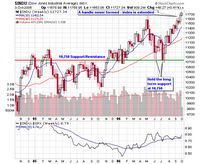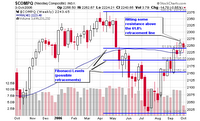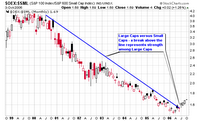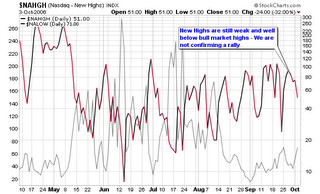The stock market is a study in human psychology with human emotion driving all market action. The market acts as a pendulum, which swings with emotion and psychology. These emotions can include but are not limited to greed, fear, hope, excitement, sadness, etc. Since the market is fueled by humans, these emotions never change. As Jesse Livermore once pointed out; the names change, the players change and the prices change but the patterns always repeat because they are patterns based on human emotion.
Emotions can and will determine your success or failure while trading the stock market. When you learn to control emotions, you are at least half way towards winning the battle. Without control of your emotions, no matter how successful a system or set of rules, consistent profits will be difficult to obtain.
The stock market is not the only place in life where human emotions are constantly flowing and can be followed or charted. While driving in the car over the past few weeks, I have heard human emotions at their highest and lowest levels while listening to sports talk radio. I am in the NY metropolitan area so the main subjects are the Yankees, Mets, Giants and Knicks. It amazes me to hear callers on a day after their team loses versus callers on a day after their team wins (many times the same exact callers).
I want to present two examples of human emotions at their best. One from the stock market and one from the sports world; the same emotions surface but they take place in different entities.
Stock Market Example:
How does the average investor react after buying a stock that:
a. Goes up in price:
b. Goes down in price:
When scenario ‘A’ takes place, most average investors will start to hope that it keeps going up but as the stock continues its advance, fear starts to overcome their emotions. They now fear that the stock may come back down and they will lose the current profit. On up days, the investor feels like a genius but is scared to allow the profit to deteriorate so he looks for every reason to sell and hate the stock. On down days, the investor has all the hope in the world that the stock will recover and he loves the stock even though it is telling him that his judgment may be wrong. As a result of these emotions, they will sell the stock with a small profit with no other reason justifying the sell. The investors kicks himself when he sees that the stock he sold for a small profit is now trading 50% higher without any major selling violations along the way.

In scenario ‘B’, the investor starts to hope that the price will rebound and the negative action is temporary. The proper research was done and the investor believes that he has a great stock and it has to be successful (the market is wrong he thinks to himself). The investor starts making excuses as to why the stock is now in negative territory. He continues to hope for a recovery and will actually purchase additional shares at the lower price by averaging down. By averaging down, he convinces himself that the entry price is now more favorable with a potential for a larger profit. The stock continues to slide and he keeps hoping for a rebound and may buy more shares by putting good money after bad.
As the stock slides, he promises himself that he will sell on the first rebound to get out with minimal damage. Finally, the stock is up a few percent but volume is higher so he talks himself into holding onto the stock because this is the start of a rebound. Emotions play with his mind and he completely ignores his rules and system. As the rebound dries up, the downtrend continues and he is now just looking to get out on the next rebound. The rollercoaster will continue until he can’t take it anymore and probably sells near the bottom. He finally sells for a large loss and walks away with his tail between his legs.
Sports Talk Radio Example:
How does the average sports fan react and feel after a win or a loss by their team:

a. Their team Wins:
b. Their team Loses:
In scenario ‘A’, fans will call up the radio station and explain why their team is the best in their division and how they are going to win it all. Some fans suggest that the coach should be given a contract extension and the management is the best in all of sports. Other fans are already talking about a dynasty and a championship next year before even reaching and winning the championship game this year. Players should get contract extensions and everyone is an MVP candidate. Nothing can go wrong because their team just won (one game – that’s all).
In scenario ‘B’, fans will completely flip flop from what they were saying last week, last month or even last night. The change of emotion is absolutely amazing when listing to sports talk radio on a daily basis. Yesterday they were crowing the team champions and today they explain why the team is a bunch of bums that won’t make the playoffs. The coach should be fired, the general manager is garbage and everyone should be traded.

By listening to the radio, I can hear human emotion whip around the same way it does on a daily chart when news hits the wire. Looking at my charts last night; I can see human emotions and reaction over the past week. Up and down with wild swings and great volatility. The newspapers are spilling over with articles from talking heads about what is happening. The evening and local news stations are now featuring so-called experts on the market after the 400 point slide. They have every Tom, Dick and Harry claiming to be an expert on knowing why the market dropped, how the glitch happened and where the market is headed. I wonder what these fools will say if the market gains 450 points today; I bet they will completely flip-flop like the sports fan.
Human emotion is amazing and I would love to study psychology on a higher level because it fascinates me. Watching the market, playing sports and listening to sports talk radio gives me a front row seat as to how most people react to nonsense. I never realized this until I started to trade but people are neurotic and change their thoughts as quickly as the second hand changes on a clock. I see these reactions at the poker as well but the clearest change in human emotion must be on the radio. Try it out and listen to how fans can switch from one extreme to another in the matter of one day and one win or loss.
As Jesse Livermore said: “There is nothing more important than your emotional balance”
But even he couldn’t follow his own advice in the end. Maybe because he was only human!
Market cartoons courtesy of www.jsdykes.com
 Theorists make money selling books that sell fear while investors and entrepreneurs make money by following their ideas with money and hedging against a possible crisis. I learn from history and history shows us that these “crisis” books will always sell during tough times. Readers eat up this garbage because most people are trapped in the rat race working their asses off just trying to stay afloat. Their attitudes are typically piss-poor and they love to read about huge negative events (especially a crash that may hurt others).
Theorists make money selling books that sell fear while investors and entrepreneurs make money by following their ideas with money and hedging against a possible crisis. I learn from history and history shows us that these “crisis” books will always sell during tough times. Readers eat up this garbage because most people are trapped in the rat race working their asses off just trying to stay afloat. Their attitudes are typically piss-poor and they love to read about huge negative events (especially a crash that may hurt others).







Connect with Me